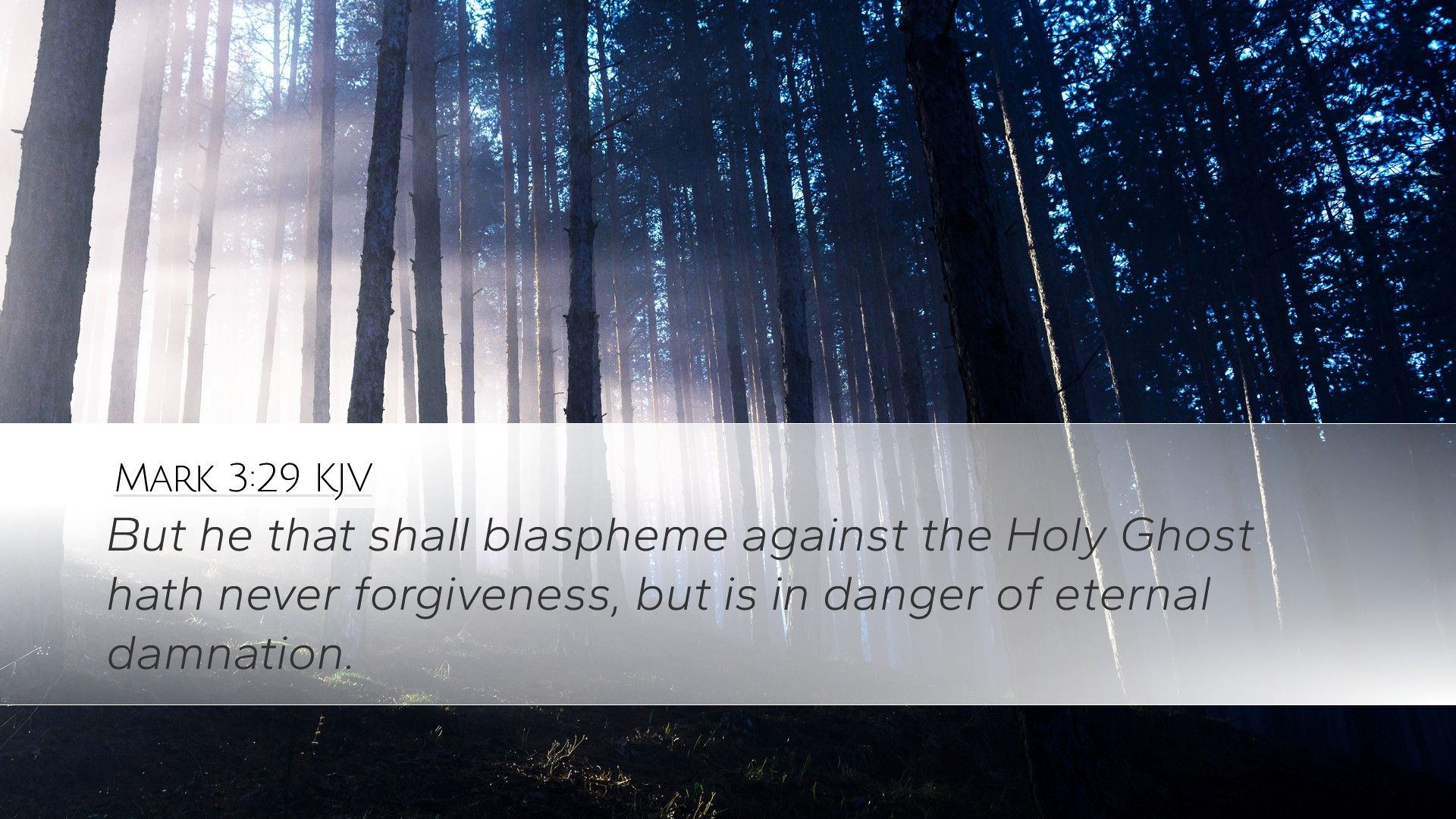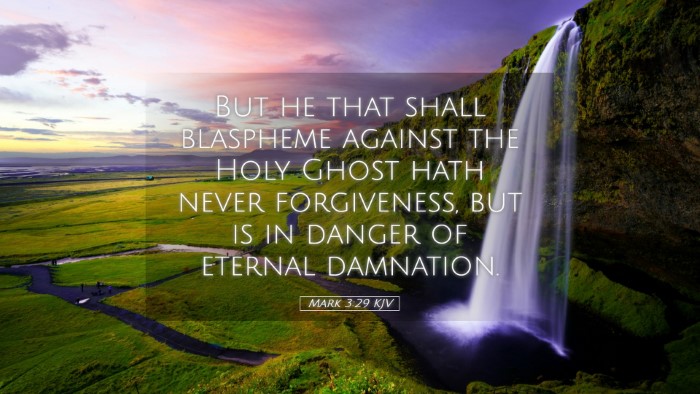Commentary on Mark 3:29
Mark 3:29 states: "But he that shall blaspheme against the Holy Ghost hath never forgiveness, but is in danger of eternal damnation."
Introduction
This verse serves as one of the most debated and solemn warnings found in the New Testament. The implications of blaspheming the Holy Spirit raise essential questions in theology concerning sin, forgiveness, and the nature of God's grace. This commentary synthesizes insights from renowned public domain commentators such as Matthew Henry, Albert Barnes, and Adam Clarke.
Contextual Background
To understand Mark 3:29 adequately, it is crucial to explore its context. Jesus is addressing the Pharisees, who accused Him of casting out demons by the power of Beelzebub. In response to their charges, Jesus explains the absurdity of a divided kingdom and affirms the truth of His ministry through the Holy Spirit. It is in this context that He pronounces His warning regarding the blasphemy against the Holy Spirit.
Insights from Matthew Henry
Matthew Henry emphasizes the seriousness of the sin of blasphemy against the Holy Spirit. He notes that this sin arises from a deliberate and conscious rejection of the truth demonstrated by the Holy Spirit. To Henry, the blasphemy here is not an isolated act but represents a persistent rebellion against God's revealed truth and grace. He posits that this sin is unforgivable because it reflects a heart completely closed to repentance.
- The Nature of Blasphemy: Henry articulates that this blasphemy involves attributing the work of the Holy Spirit to evil. Such an act indicates a profound spiritual blindness.
- Consequences: The consequence of such a sin is not merely the absence of forgiveness but a state of existing in eternal condemnation. This reflects the weight of choice in rejecting God’s offer of grace.
Insights from Albert Barnes
Albert Barnes provides a detailed exegesis of the term "blaspheme" as used in this verse. He explains that blasphemy against the Holy Spirit refers to a resolution to deny the divine character of the Holy Spirit's manifestations through Jesus. Barnes clarifies that while all sins can be forgiven through repentance, the conscious, intentional rejection of the Holy Spirit constitutes a definitive stance against God's work.
- Intentional Rejection: Barnes underscores that the unforgivable nature stems from the individual’s awareness of the acts of the Holy Spirit and their willful resistance to acknowledge this truth.
- Spiritual Condition: He argues that the state of an individual who commits this sin is one of increasing enmity towards God, resulting in a rejection of the only means of forgiveness.
Insights from Adam Clarke
Adam Clarke approaches the passage by discussing the broader implications of the sin against the Holy Spirit. Clarke notes that this sin should not be interpreted lightly; it serves as a caution against the trivialization of the workings of the Spirit of God. He asserts the importance of being aware of one's spiritual condition in relation to recognizing the Holy Spirit's influence.
- Awareness of Divine Work: Clarke stresses that understanding and recognizing the work of the Holy Spirit is essential. Ignoring or belittling this work can lead to a hardened heart that is intolerant of divine grace.
- Community Implication: He posits that the dynamic of community faith can influence individuals to seek genuine repentance and not fall into the trap of blaspheming the Spirit.
Theological Implications
The warning about blasphemy against the Holy Spirit accentuates critical theological themes such as human depravity, the necessity of grace, and the finality of divine judgment. It calls the church to address the realities of sin while also proclaiming the hope found in repentance and faith in Christ.
- Human Depravity: This verse illustrates the depths of human sinfulness and the necessity for divine intervention.
- The Necessity of Repentance: It emphasizes the importance of understanding one's sins, the need for sincere repentance, and the continual open invitation for forgiveness found in Jesus Christ.
- Final Judgment: It serves as a sobering reflection on the reality of judgment, encouraging believers to live in alignment with the Spirit's leading.
Conclusion
Mark 3:29 remains a profound and serious exhortation about the urgency to respond to the workings of the Holy Spirit in our lives. Drawing from the insights of Matthew Henry, Albert Barnes, and Adam Clarke, we come to understand that this verse not only warns against a specific sin but also reaffirms the importance of recognizing, honoring, and responding to the grace offered through the Holy Spirit. This call for vigilance and humility in the face of divine truth is especially relevant for pastors, students, theologians, and Bible scholars, reinforcing the necessity of a heart aligned with God's purposes.


